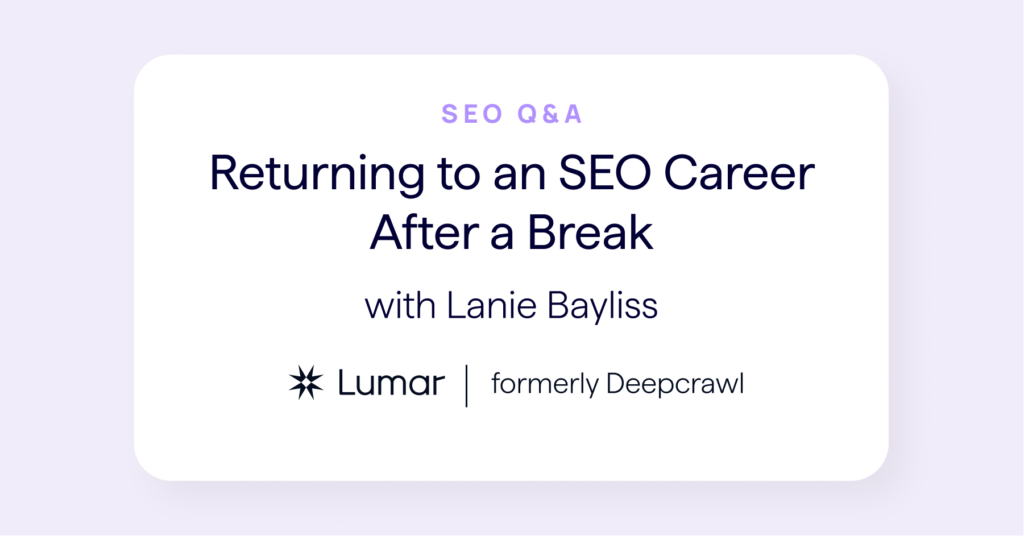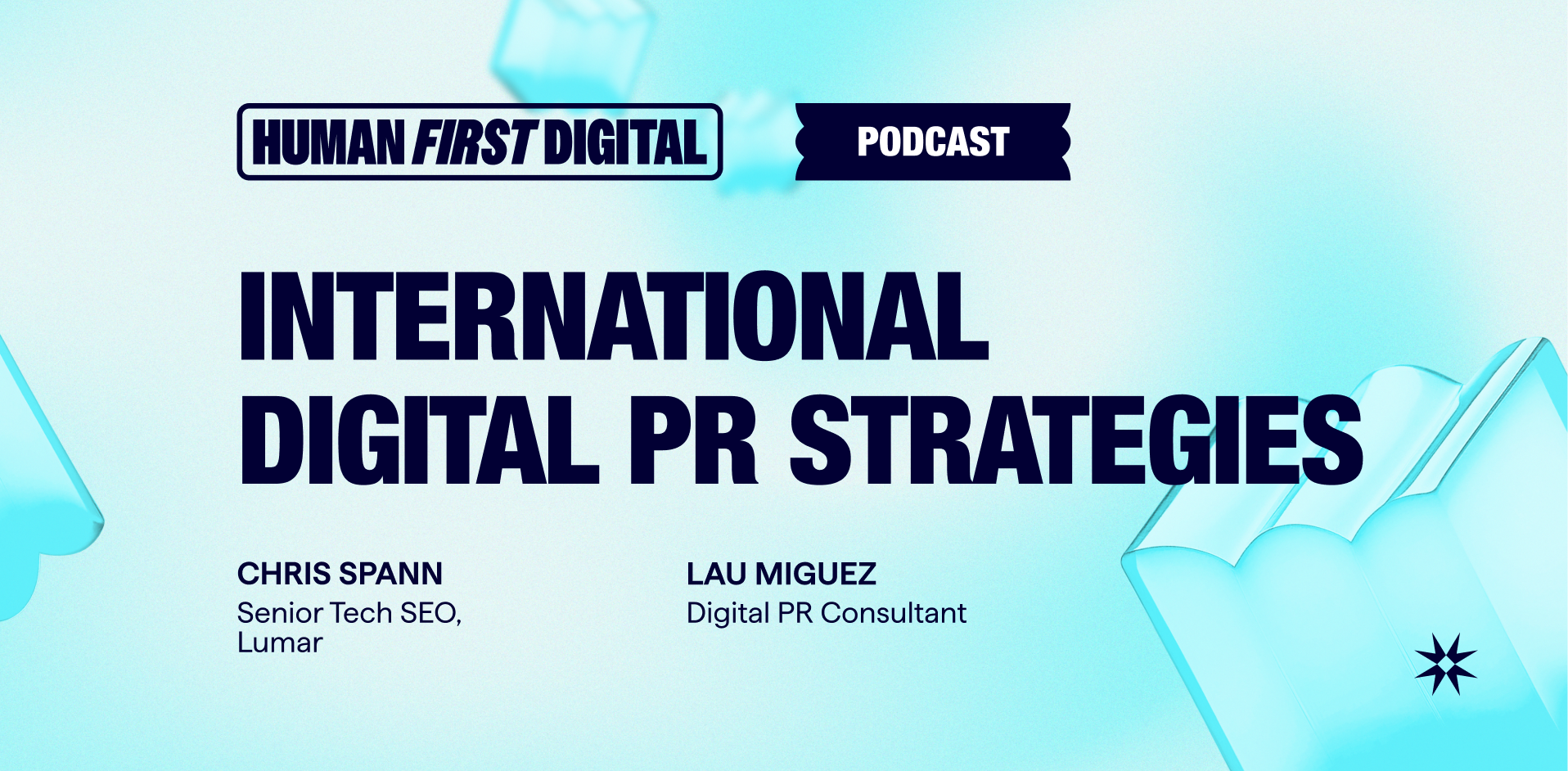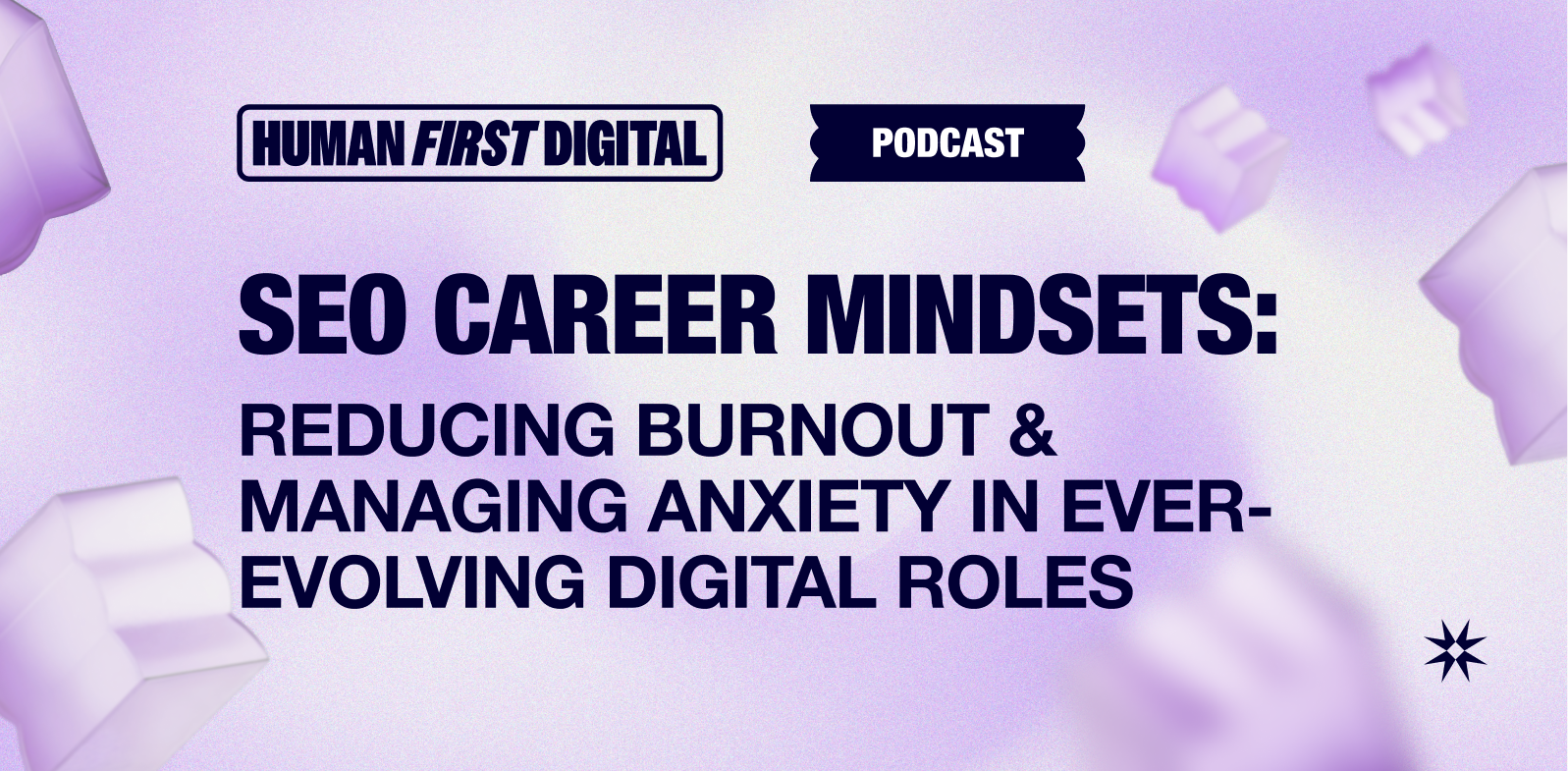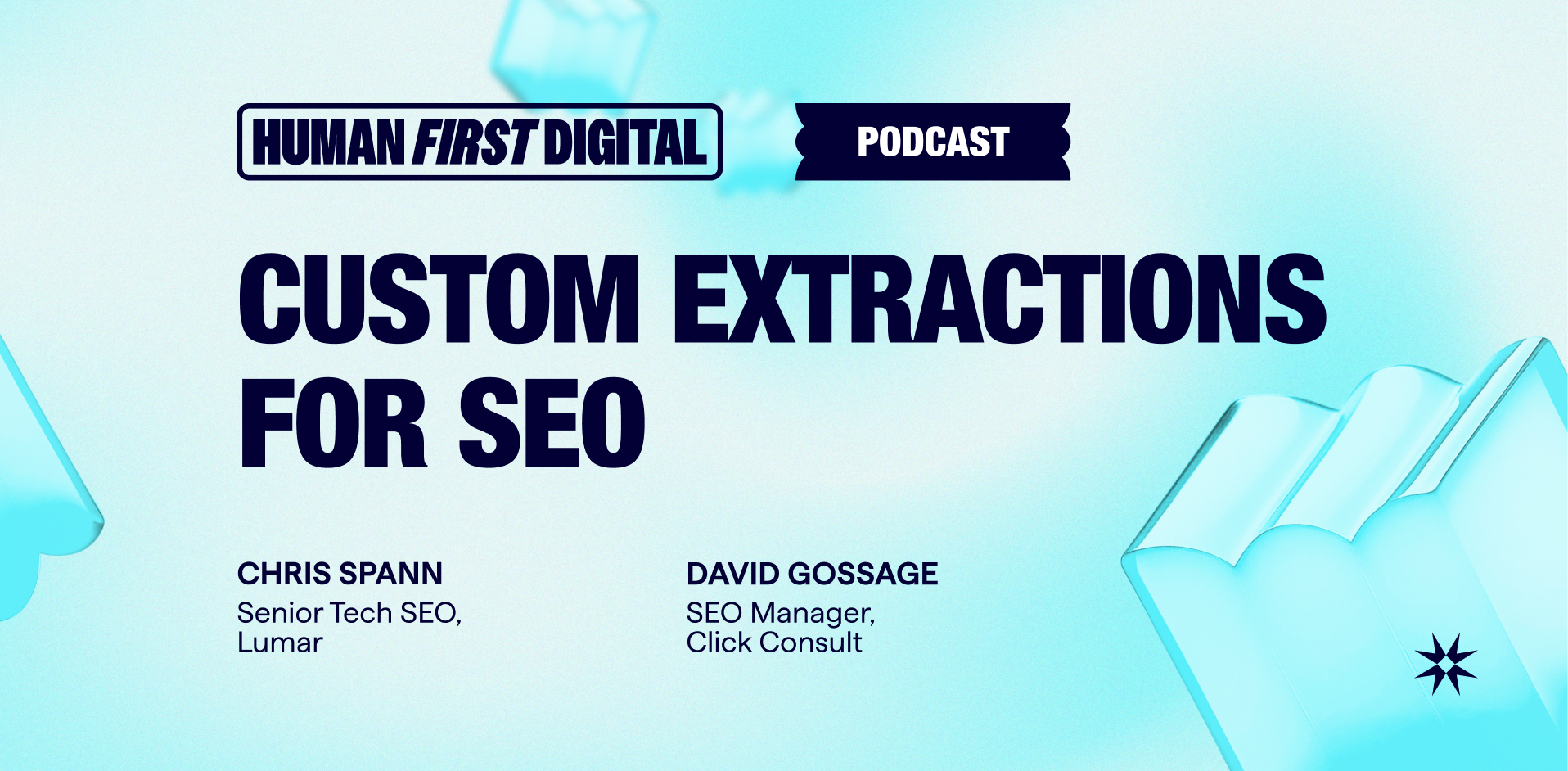Our SEO interview series continues — This week, Lumar’s Jamie Indigo, Senior Technical SEO, is in conversation with Lanie Bayliss, Digital Account Manager at the MTM Agency. The two speak about returning to a career in SEO after taking a break, the challenges of being a working parent in tech, and how to get involved with the wider SEO community through conferences and events.
Q: Hello and thanks for joining us today. I have the fantastic Lanie with me here. We are both back from the BrightonSEO World now, but this past spring was Lanie ‘s first chance to speak on stage at Brighton. Thank you for joining us. How are you doing today?
Lanie: Yeah, good, thank you.
Q: Where are you based out of?
Lanie: So I’m based in Devon. I work remote full time, but I’m in Southampton today at our HQ.
Q: Wonderful. What’s your professional title?
Lanie: I’m a digital account manager.
Q: What does that entail?
Lanie: Lots of things! I hold my own accounts, but I’m also involved in all of the project work, so that could mean a bit of SEO, a bit of content writing, editing websites. I do it all, basically.
Q: Fantastic, a jack of all trades. What was your talk about at Brighton this year?
Lanie: I discussed returning to a career in digital after taking a break. And in my case, having a baby. Basically, talking people through how they can prepare for that time away in order to make it less daunting upon your return, but also the ways in which your workplace can assist you in making sure that transition back into work isn’t a scary one.
Q: It was a really powerful talk. One of the things you said that really stuck with me was, when you’re a new mother, everyone wants a piece of you. Why was this subject so important to you?
Lanie: I think obviously, this is an uncomfortable topic for some. I feel like this topic, along with menstrual health, which was another talk that was discussed this year —
Q: Yes, Chloe Rose gave a great talk on that one!
Lanie: Exactly. And other topics like these are being discussed a little bit more openly in the industry now. A few years ago, I think at the last in-person Brighton SEO that I went to, there was a speaker called Amy who did a talk on imposter syndrome and digital burnout. I think it was the first talk I’ve ever listened to at a professional conference that discussed the personal side of business. It wasn’t completely focused on the successes and the, “look at this amazing project that I had.”
Q: “Here’s my graph!” No. Here’s a uterus.
Lanie: Exactly. She was a business owner standing up and talking about the challenges that she had to overcome, the failures, the kind of raw real life. She had a car accident that she then had to recuperate from. And it made her realize that she needed a better work-life balance. My story is similar, where I had fertility issues, underwent medical appointments and kind of was told, “you need to start your family now or not at all.”
And then obviously having a baby in itself is a huge life change.
Q: You’ve created a whole new way to tell time by a tiny human.
Lanie: [laughter] Yeah. So like her car accident, which was a poignant moment in her life where she pivoted and realized that she needed to spend more time with loved ones, having a baby completely shifts your priorities. So while I was very career driven and focused in my twenties, now, in my thirties, it’s about getting that work-life balance.
I think what I wanted to highlight at the beginning of the talk was actually how working women, particularly ones that have children, are on the back foot in many ways. [I wanted to talk] about that, and making people aware, I think, especially for employers.
Q: What do you mean by the back foot? For those who don’t have a uterus, don’t have children, give us a tableau of what that kind of reticence looks like.
Lanie: So I suppose one of the biggest sacrifices for a person going away and having a child is that you have to take quite a large chunk out of your career, particularly in the UK. I understand that we have an international audience at BrightonSEO, so it doesn’t apply to everyone there. But in the UK, you can take up to a year, I believe, to have maternity leave. Which, if you think about it, is a very long time to take out of your career.
It’s also notoriously badly paid. So not only are you taking time out of the industry, but you’re also sacrificing a lot of your salary that you worked so hard to achieve. And, more often than not, it falls to the women to make that decision about their career. Not not the man, not the husband, not the partner. The other thing with that, for me, is when a working mother returns to work, [there can be] a bias towards working parents; the idea that they’re either dedicated to work and not spending enough time with their family, or it’s the other way around, the idea that they’re leaving early to spend time with the family, or they’re working part-time to cater to their family, and they don’t appear dedicated to that work. And I suppose the final point that I’m trying to put across in my talk is: flexible working is the solution to that. And if employers can have that more flexible approach, you know, parents, in general, bring so many brilliant approaches to a workplace.
[Employers shoulder] utilize them, their strengths. And the way to do that is by accommodating their schedules and the responsibilities that they have at home. But it doesn’t just hold true for parents, it’s also anybody that has any other responsibilities [outside of the workplace], whether it’s mental health, whether it’s, you know, moving away from the city to live in the countryside and you want to go remote. All of that should be facilitated, I believe, and discussed, and there should be [a better] option for people returning to work.
Q: Brilliant. This is the idea that we are more than our productivity — we’re humans first. And I love seeing this cultural shift. You know, I identify as a woman, and there are many folks of any gender who menstruate. Yet that has been stigmatized and people feel they are not even allowed to talk about it. That has a physical impact on us.
Parents, you are literally how the world keeps going. Thank you for your contributions. We need more good humans and you have taken part of yourself in so many metaphorical and physical ways to make this tiny human and hopefully raise another excellent human in this world. This is such a beautiful topic, and I love that you’re bringing it forward. Were you nervous to give this talk?
Lanie: I was nervous in the lead-up to it, but actually on the day, I had my little one with me at the hotel the morning of the talk. So I was in my mode. And then when I actually got to Brighton SEO, I was pretty much one of the first talks there, so I didn’t have time to be nervous.
Q: We talked a little about who inspired you. Seems like it was this great work by a speaker who was in an unfortunate accident, and she publicly shared what the experience was like to come through all of that. What was your favorite moment at Brighton this year?
Lanie: There were a lot more talks this year based on [larger subjects]. They don’t always have to be about SEO, and being technical, and showing success. I liked the talks where they actually proposed a challenge in the industry, kind of schooling us on things that we should probably be more aware of. So take the menstrual health talk this year, for example. Not something that all the males in the audience, or those that don’t menstruate, are going to be particularly comfortable around, but it’s something that I believe they should be exposed to. They may go away now and actually think about those employees of theirs, or those colleagues of theirs, that are going through that in a different light and hopefully they can be more supportive. So I think that was one of my favorite takeaways. That there’s room for more human talks, the more raw talks.
Q: We’re increasingly digital, so this has to force and counterbalance us to keep us in check with regard to the more human elements of our work.
Lanie: Absolutely. And then, obviously, the impact of COVID has been a huge topic in the last few talks, and there were a few on the hiring process. I think one was by Kim Dewe from Blu Array. (See the slide deck: Transitioning into People Management)
Q: Begum Kaya also talked about advocating for these people who aren’t in major metro areas or perhaps don’t have that shiny diploma but have tenacity and skill.
Lanie: Yeah, new tips on hiring people. And I think that the hiring process, the recruitment process has dramatically changed since the pandemic. People are choosing to work remotely or hybrid. And I think that’s changing the face of digital careers. So yeah, those were incredibly insightful talks.
Q: And we’re in such high demand now, us digital folks. I’m sure your inbox every day has something from someone hiring somewhere. I personally got into SEO because there were no jobs at the time. And now to see digital thriving so much, it’s an interesting 180.
Lanie: We’re in high demand!
Q: How did you get into SEO? How did you get to this career path?
Lanie: Good question. So I graduated uni with a degree in English lit and creative writing.
Q: Hey! Respect — team creative writing!
Lanie: I didn’t even know digital marketing was a career option. I came straight out of university and worked as a project manager at a web design company. Managing clients is very admin-based and that sparked my interest in building websites. How you get it on Google. And actually the company I worked for didn’t believe SEO was a thing and told its clients, “It doesn’t matter, you don’t need to know about this.”
And I thought, “I’m sure it does matter.”
Q: I’m sure that won’t come back to haunt them.
Lanie: So when I left them after six years, I went and worked for an agency that specialized specifically in SEO for nine months, just to see if it was the route I wanted to go down. And that confirmed for me that digital marketing was where I wanted to be. So I then freelanced for a little bit while I looked for a company that I really wanted to work for.
And I think that’s not something most people do. But going freelance meant that I could take my time looking for a job. And find the right one.
Q: You get to interview them before you agree to work for them. I found when I was a consultant, it was a good way to measure, “Am I compatible with your team? Let’s see how we can interact in this scope.”
Lanie: Company culture. And also looking at what clients they had on their books. So, who do I want to be working with? Freelancing gave me that luxury while trying to find the job that fit best. And that’s how I found The MTM Agency.
Q: What did you look for in company culture?
Lanie: A mix of ages was a big one for me. I’d worked at a previous agency where it was all graduates straight out of university and I found, unfortunately, those companies were the ones that were paying the least amount. Their training programs and progression weren’t really happening. So yeah, I was looking for a company that had a diverse age group, but also I knew I wanted to work in an agency setting because I love all the different areas in digital marketing.
I wanted the ability to stay an all-rounder, but specialize if I wanted to. The other thing was training opportunities. And, I think the first week I started, my boss put me on the Google Squared online course, and it was amazing. So yeah, things like that.
Q: So you’re looking for somewhere that has the values, different perspectives, and diversity in it. Ageism is very real in our industry. I can’t recall the last time I saw someone who was over 40 on stage. It tends to be a rather rare scenario. And I always find it strange, because we are all going to age. Time is not something you can negotiate with. So by forcing this idea that you become irrelevant at a certain age in tech, you are essentially dooming yourself.
Lanie: I’m 32 and I think I’m one of the youngest in the agency, so that’s quite a good base up for that one.
Q: You’re in an agency which means you’re working with a lot of teams. How do you make allies across teams?
Lanie: This was different before the pandemic, while we were all office-based. It was a lot easier, I think, to break down the silos and work across departments that you maybe wouldn’t come across normally. I think now that we’re more remote, it is more difficult. But I implemented an initiative called “coffee roulette” at our agency last year. It’s where you get paired randomly with another colleague in the company and you’re tasked with having a virtual coffee with them. It’s about half an hour, I would say. And you’re encouraged to talk about your jobs. If it’s someone that you don’t really know or you haven’t worked with before, you can find out what their role is in the company, what projects they’ve been working on, what they do.
But if you’re paired with somebody that you work with quite often, it’s that chance to talk about life instead of work. So, how are you actually doing?
Q: We’re missing these coffee pot moments. That little bit of kismet that happens in the kitchen at work, where you’re waiting for your coffee and you get to meet someone that you wouldn’t normally talk to you.
Lanie: Yeah. When a new person starts now, if you’re not in the office, you don’t see them being walked around and introduced. Now that’s done online. [Coffee roulette] is a really good initiative to make sure everybody meets everybody.
Q: I love that. I want to see more companies adopt that. What’s your favorite thing about working in SEO?
Lanie: The variety—and I think probably all of us say that. No day is the same. I think I would struggle to go to a job now where your job is the same every single day, with a set routine. In my role, I am working on something different every day. Today it was paid campaigns and getting those set up for a client. Tomorrow, it might be writing a guide for a website. I mean, I’ve just written one about how to buy a boat so I’m an expert on that now. [laughter]
Q: How to buy a boat!
Lanie: A boat-buyer’s guide. Every day is different, and that’s what I love about this industry!
Q: I love it. How do you explain the benefits, or the ROI, of SEO to others in your organization, or in your clients’ organizations? How do you measure?
Lanie: Luckily, I don’t have to explain that to anybody in my own organization; they all know. In terms of explaining it to clients, you have to explain that it’s a long-term solution, which they don’t always like to hear, especially if they’re very driven by quick results.
Q: What? You mean you can’t just push a button and get money?
Lanie: Yeah. I think they’re paying you for your expertise, so you’re also teaching them as they go as. So they’re not just getting the value of the SEO, the results, the data, they’re also learning from you. And I quite like to do that with clients that are happy to learn, that don’t just want to throw money at it and see results. The ones who actually want to sit down and learn why you’re doing what you’re doing. Those are probably my favorite clients. They kind of say, “Why are you doing that?” You explain it and they’re like, “Oh, that’s really clever.”
Q: It actually begins to grow and become more of a cultural foundation for the group. That’s beautiful to see.
Lanie: So I think my favorite clients are also the ones that see you as an extension of their team, rather than a separate entity that they just throw money at. It’s much nicer for them, and for you, to feel like they’re relying on you as part of their marketing team, or talking to you like you’re a colleague. That’s my favorite collaborative approach.
Q: I love it. What drives you to attend events like BrightonSEO? What’s your motivator?
Lanie: The first time I went to BrightonSEO, I knew nothing about SEO at all, and I had never been to Brighton. So the appeal is, it’s a nice place, and you feel like you’re going to learn something new. Now as I’m getting older, and obviously more experienced (I’ve been in the industry for a decade now)… now, it’s more about the networking options, meeting big people in the industry that you see on Twitter. You already feel like you know them in real life and then you see them in person for the first time.
Sitting there and hearing people saying the things that I’ve been doing, I’m thinking, “Right okay, I’m on the right track. I’m doing the right thing.” Which is always nice, a bit of validation.
Q: Do you have any advice for someone who is considering pitching to speak for the very first time at Brighton or other industry events? They have the FOMO, they know about it, they want to get up there. But they’re scared. What do you tell them?
Lanie: The best way to persuade someone to do it, or to give them the encouragement to do it, is to tell them about what it feels like once you’ve done it—because, more often than not, when you walk off that stage, you’re like, “I want to do it again!”
Q: There’s like a radiance. There is this supercharge.
Lanie: Yeah. I think that would be what would sway somebody to do it. Just tell them what it feels like once you’re done. And they will be wanting to get up there right away and do it again.
Q: I agree with you. I think my first or second international talk was at Brighton and it was electric. It fills my cup. It was a beautiful thing. Do you have advice for people who’ve never been and are considering going for the first time? Say we have a newbie, what would you tell them?
Lanie: Not to be scared of any judgment. Particularly with a talk like mine, there was no wrong or right answer. It’s purely my experience of something. So I think just having the confidence that nobody is going to sit there and be like, “Oh, this is complete rubbish.” That’s not the case. It may spark discussion, which is what you want! People coming up to you at the end and kind of saying, “Oh, that point that you said…” They may have something to add to it or they may have another take on it, but no one’s going to come up to you and be like, “That was wrong.” That can be a fear in someone’s mind before speaking, that they don’t feel like they’re expert enough, or they may say something that others disagree with. I don’t think that should be a worry.
The SEO community is very friendly for the most part. I mean, there’s always one. But we’re a friendly community, and we’re always looking to uplift, “How can we knowledge share?” So that’s always important to have in the back of your mind.
Q: That’s beautiful. If people want to follow you, is there a platform you’re on? How could they get in touch with you?
Lanie: I’m on Twitter @Landoflanie.
Q: Wonderful. Thank you so much. Those who have access to the Brighton rewatch videos, go give this one a view. I love that we are empowering ourselves to be humans first, and as our lives are increasingly digital, to talk about how truly human we are.
Thank you so much, Lanie, for joining me today. I appreciate you and I can’t wait to see the next event.
You can find Lanie Bayliss on Twitter. Jamie Indigo is also on Twitter — and on Deepcrawl’s Professional Services Team.
Want more first-hand knowledge straight from some of the world’s best SEOs? Check out our full interview series with search optimization experts.





